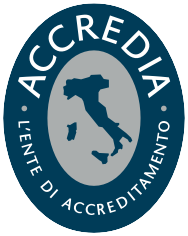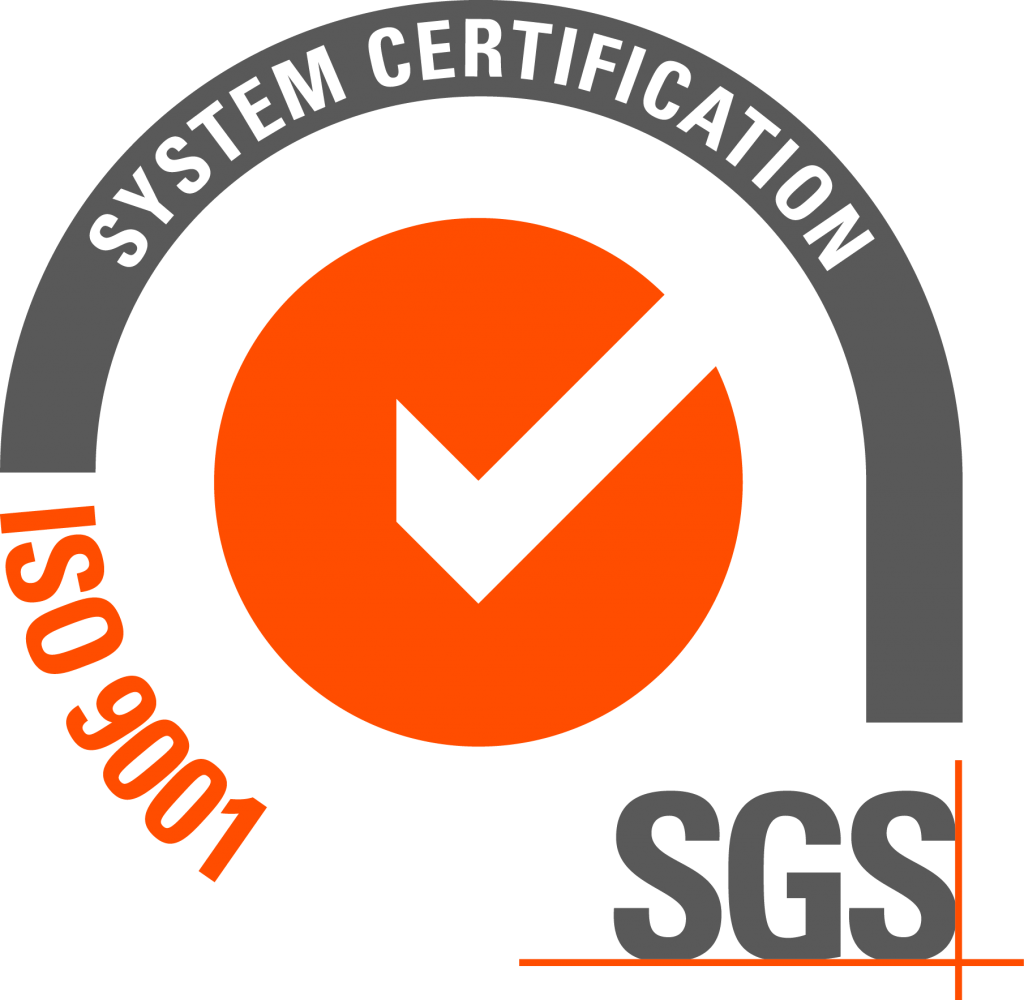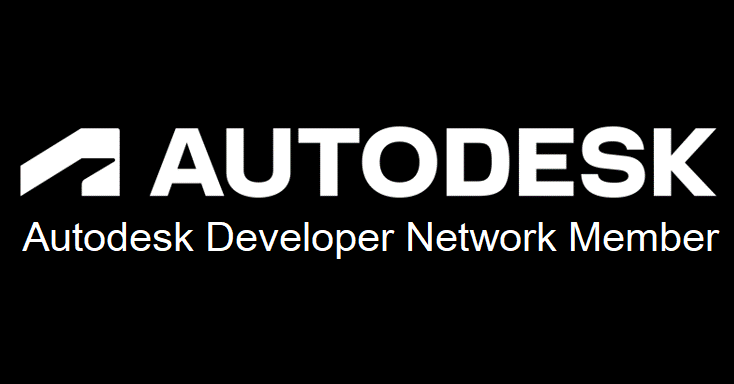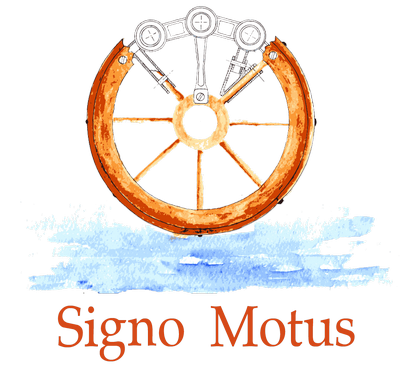
Services
Signo Motus offers innovative technological services and turnkey solutions, according to customers requirements, in the following domains:
- Design, 3D modeling and numerical simulations;
- Robotics and automation;
- ICT and software solutions;
- Additive manufacturing.
The design and development (D&D) department of Signo Motus consists of a design unit and of a prototyping unit, that work in close contact with each other and with the customer. Such units are made up by a multidisciplinary team of engineers with several years of experience that is able to deliver advanced and innovative solutions according to customer's requirements.
The added value is provided to the customer through a strong synergy between the design and the prototyping phases, which enables validated learning and continuous optimization. The utilization of advanced parametric modeling and simulation tools allows the design unit to virtually verify the design, while the prototyping phase enables the design validation and its subsequent optimization. Moreover, the relevant and cross-cutting experience of the team in industrial applications and in research and development enriches the design with innovative ideas and solutions. The customer is involved in the process by means of a user-centred design approach, ensuring compliance to requirements and prompt delivery.
Design, 3D Modeling and Numerical Simulations
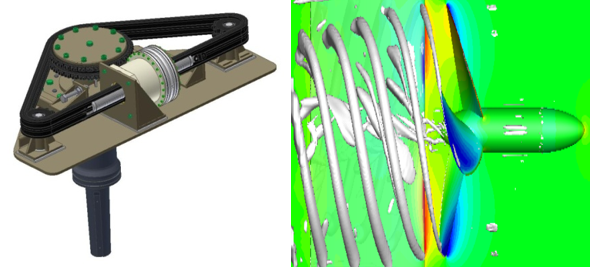 Ad-hoc 3D modeling and numerical simulations are used to ensure an efficient design process. The 3D parametric modeling software enable the creation of a detailed virtual model of the system
to be designed, allowing to verify its technical and functional specifications. Moreover, numerical simulation are conducted by means of software tools leveraging
the Finite Element/Volume Method (FEM/FVM) for structural, thermal and fluid dynamic applications.
The behaviour of the system is thus simulated in virtual working conditions to assess compliance to requirements.
The design is consistently validated during the process through prototyping. Additive or subtractive manufacturing techniques are used to produce prototypes
and proper testing tools and methods are employed to collect relevant design data. Such a process aims to consistently tune the design to finally achieve the optimal solution.
The design process is finalized with the production of the final technical drawings.
Ad-hoc 3D modeling and numerical simulations are used to ensure an efficient design process. The 3D parametric modeling software enable the creation of a detailed virtual model of the system
to be designed, allowing to verify its technical and functional specifications. Moreover, numerical simulation are conducted by means of software tools leveraging
the Finite Element/Volume Method (FEM/FVM) for structural, thermal and fluid dynamic applications.
The behaviour of the system is thus simulated in virtual working conditions to assess compliance to requirements.
The design is consistently validated during the process through prototyping. Additive or subtractive manufacturing techniques are used to produce prototypes
and proper testing tools and methods are employed to collect relevant design data. Such a process aims to consistently tune the design to finally achieve the optimal solution.
The design process is finalized with the production of the final technical drawings.
Robotics and Automation
 Signo Motus provides design and installation services for application-oriented robotic platforms or automation systems (e.g. for process automation and optimization).
A key asset for the design is the Off-Line Programming (OLP), performed by means of general purpose and vendor specific robotic simulation and programming tools.
OLP is employed to virtually simulate the robotic platform, performing its verification and optimization.
The development process includes: design, programming, system integration and installation, testing and validation.
Moreover, the company provides maintenance and technical assistance services for industrial robotics stations.
Signo Motus provides design and installation services for application-oriented robotic platforms or automation systems (e.g. for process automation and optimization).
A key asset for the design is the Off-Line Programming (OLP), performed by means of general purpose and vendor specific robotic simulation and programming tools.
OLP is employed to virtually simulate the robotic platform, performing its verification and optimization.
The development process includes: design, programming, system integration and installation, testing and validation.
Moreover, the company provides maintenance and technical assistance services for industrial robotics stations.
Signo Motus acts as distributor of Yaskawa Motoman industrial robots and robotic automation systems (www.motoman.com).
Thanks to Motoman high quality and innovative robotic automation solutions, the company is able to fully meet the application requirements in the industrial field.
ICT and Software Solutions
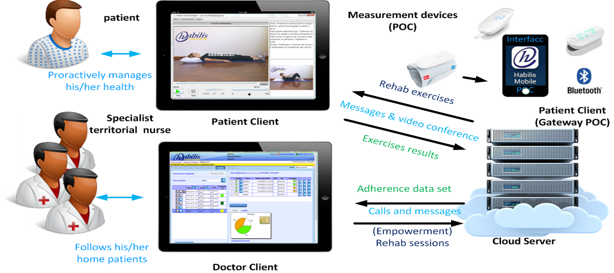 The company offers complete ICT solutions and services to end-users, with particular reference to the e-Health field.
The development process includes: analysis of the requirements, identification of system specifications, design, development, testing and implementation.
The whole development process is managed in compliance with the applicable ISO standards for medical devices (ISO 27000 series, ISO 13485, ISO/IEC 62304, ISO 14791).
Moreover, the company provides maintenance and technical assistance services for ICT and e-health solutions.
The company offers complete ICT solutions and services to end-users, with particular reference to the e-Health field.
The development process includes: analysis of the requirements, identification of system specifications, design, development, testing and implementation.
The whole development process is managed in compliance with the applicable ISO standards for medical devices (ISO 27000 series, ISO 13485, ISO/IEC 62304, ISO 14791).
Moreover, the company provides maintenance and technical assistance services for ICT and e-health solutions.
Additive Manufacturing
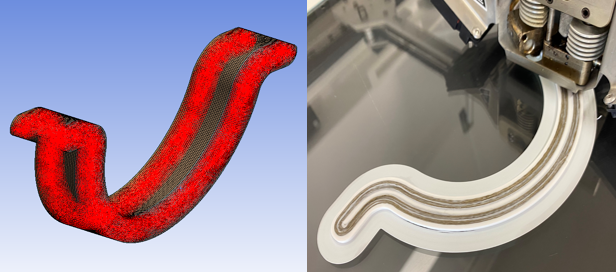 The design and additive manufacturing (AM) services are focused on application-oriented composite components.
The AM process employed is based on Fused Deposition Modelling (FDM) and enables the utilization of different matrices and short or continuous fibres
through a flexible production process, offering interesting possibilities for high performances at low weights and costs.
Ad-hoc 3D modeling and numerical simulations techniques are used to optimally design the component to be manufactured.
In particular, the fibre reinforcement and the part external or internal shapes (e.g. lattice structures) are selected to maximize performances and reducing weight.
Hereafter, proper 3D printing profiles are developed and the component is produced and, if needed, finally tested to ensure the compliance to requirements prior delivery.
The design and additive manufacturing (AM) services are focused on application-oriented composite components.
The AM process employed is based on Fused Deposition Modelling (FDM) and enables the utilization of different matrices and short or continuous fibres
through a flexible production process, offering interesting possibilities for high performances at low weights and costs.
Ad-hoc 3D modeling and numerical simulations techniques are used to optimally design the component to be manufactured.
In particular, the fibre reinforcement and the part external or internal shapes (e.g. lattice structures) are selected to maximize performances and reducing weight.
Hereafter, proper 3D printing profiles are developed and the component is produced and, if needed, finally tested to ensure the compliance to requirements prior delivery.
